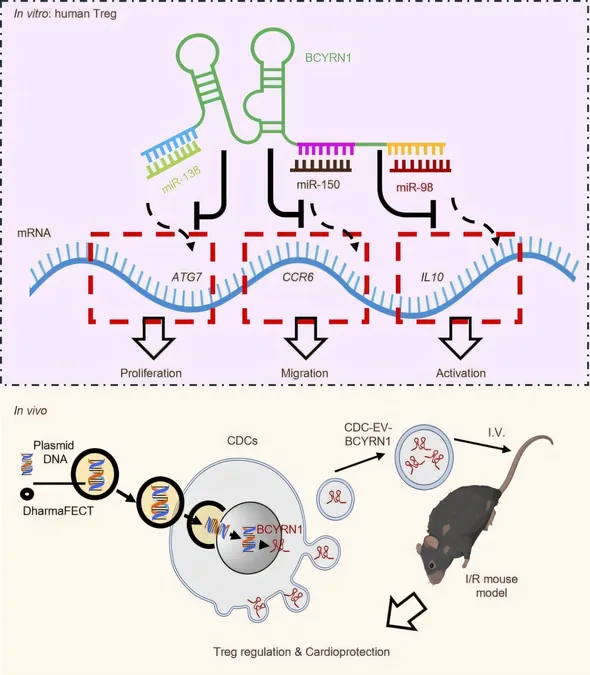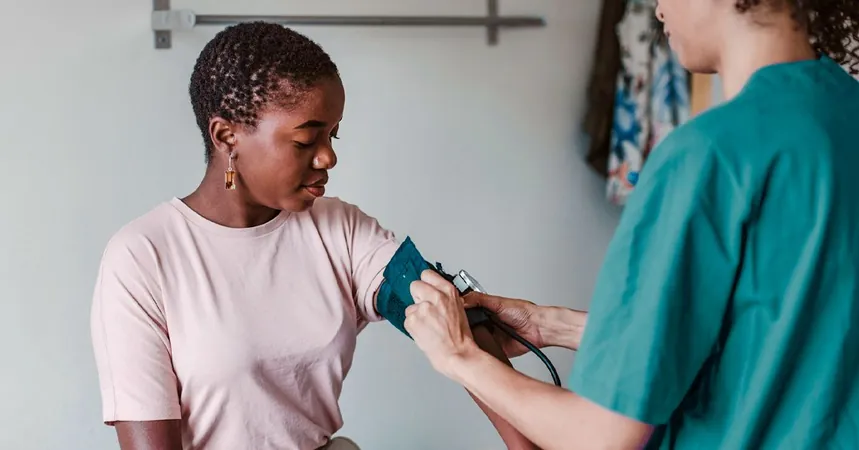
Revolutionary Discovery: Anti-Inflammatory Boost Could Transform Heart Attack Recovery!
2025-03-26
Author: Arjun
Groundbreaking Study Reveals New Technique
A groundbreaking study from the Smidt Heart Institute at Cedars-Sinai reveals a game-changing scientific technique that significantly enhances the body's production of anti-inflammatory cells, promising to revolutionize recovery after heart attacks—not just in mice but potentially in humans too!
The Challenge of Uncontrolled Inflammation
Published in the esteemed Journal of Clinical Investigation, this research tackles a major obstacle in heart attack treatment: uncontrolled inflammation. Heart attacks, which afflict over 800,000 individuals in the U.S. annually, lead to severe heart muscle damage due to inadequate blood flow from arteries. Despite great strides in medical interventions that ensure over 90% of patients survive these life-threatening events, many continue to suffer from tissue damage when their immune systems overreact. This overreaction can trigger harmful inflammation, weakening the heart and increasing the risk of heart failure.
Focus on Regulatory T-Cells
Recognizing this critical issue, the Cedars-Sinai researchers honed in on the body's regulatory T-cells (Tregs), which play a vital role in managing the immune response and preventing overreaction to injuries. Traditional methods to increase Treg levels—entailing extraction, lab expansion, and reinfusion of these cells—are far too slow to be effective during acute crises like heart attacks.
Innovative Method to Stimulate Tregs
Innovatively, the Cedars-Sinai team devised a method to stimulate the body to produce more Tregs autonomously. By infusing extracellular vesicles containing a specific RNA molecule named BCYRN1, they successfully prompted a rise in Treg populations in mice shortly after heart attacks. Extracellular vesicles, which are minute fluid-filled sacs released by cells into the bloodstream, were instrumental in this process.
Laboratory Findings and Results
Laboratory experiments on human tissue laid the groundwork for understanding how BCYRN1 enhances Treg activity. After administering the vesicle infusions just 15 minutes post-heart attack in mice, researchers observed remarkable results. The treated mice exhibited a significant increase in Tregs in their hearts, sustained less cardiac tissue damage, and demonstrated reduced inflammation compared to those that did not receive the treatment. Notably, their hearts retained more of their pumping capacity—a critical factor in post-heart attack recovery.
Significance of the Research
Dr. Ke Liao, the study's first author, emphasized the significant role of BCYRN1 in mitigating inflammation following heart attacks, asserting, "These findings validate the effectiveness of using extracellular vesicles to harness these benefits in mice."
Potential for Broader Applications
The extraordinary extracellular vesicles utilized in this study were generated from cardiosphere-derived cells (CDCs), which naturally contain elevated levels of BCYRN1. Dr. Eduardo Marbán, the senior author and executive director of the Smidt Heart Institute, has invested years into developing these progenitor cells derived from human heart tissue.
Future Implications
While this research primarily focused on animal models, it holds vast potential to pave the way for innovative immunotherapies applicable not only to heart attack recovery but also for a myriad of conditions, including lupus, organ transplant rejection, and other inflammatory disorders. As scientists continue to explore this promising avenue, the hope for improved therapeutic strategies grows, potentially transforming how we treat heart attacks and enhance recovery for countless individuals in the future. Stay tuned as we track developments in this exciting field!


 Brasil (PT)
Brasil (PT)
 Canada (EN)
Canada (EN)
 Chile (ES)
Chile (ES)
 Česko (CS)
Česko (CS)
 대한민국 (KO)
대한민국 (KO)
 España (ES)
España (ES)
 France (FR)
France (FR)
 Hong Kong (EN)
Hong Kong (EN)
 Italia (IT)
Italia (IT)
 日本 (JA)
日本 (JA)
 Magyarország (HU)
Magyarország (HU)
 Norge (NO)
Norge (NO)
 Polska (PL)
Polska (PL)
 Schweiz (DE)
Schweiz (DE)
 Singapore (EN)
Singapore (EN)
 Sverige (SV)
Sverige (SV)
 Suomi (FI)
Suomi (FI)
 Türkiye (TR)
Türkiye (TR)
 الإمارات العربية المتحدة (AR)
الإمارات العربية المتحدة (AR)